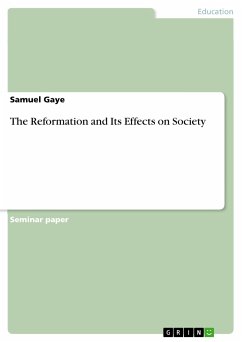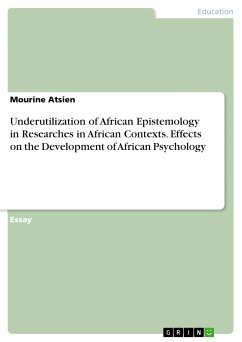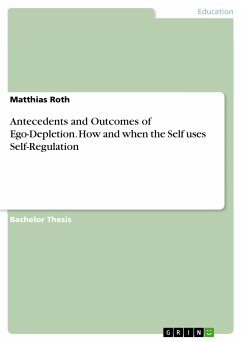
The Reformation and Its Effects on Society (eBook, PDF)
Sofort per Download lieferbar
Statt: 18,95 €**
15,99 €
inkl. MwSt. und vom Verlag festgesetzt.
**Preis der gedruckten Ausgabe (Broschiertes Buch)
Alle Infos zum eBook verschenkenWeitere Ausgaben:

PAYBACK Punkte
0 °P sammeln!
Seminar paper from the year 2021 in the subject Didactics - Theology, Religion Pedagogy, grade: 4, , language: English, abstract: In this paper, I will endeavor to provide a historical overview of the reformation and the factors that led to the reformation. I will also highlight a few men who challenged and exposed corruption in the church prior to the onset of the larger reformation movement. These men usually met catastrophic endings, but they were the forerunners of the reformation. They were way ahead of their time. Next, I will examine the reformation era as I tried to delineate why the r...
Seminar paper from the year 2021 in the subject Didactics - Theology, Religion Pedagogy, grade: 4, , language: English, abstract: In this paper, I will endeavor to provide a historical overview of the reformation and the factors that led to the reformation. I will also highlight a few men who challenged and exposed corruption in the church prior to the onset of the larger reformation movement. These men usually met catastrophic endings, but they were the forerunners of the reformation. They were way ahead of their time. Next, I will examine the reformation era as I tried to delineate why the reformation was necessary and inevitable. You will see why the reformation was successful compared to earlier calls for reformation of the church. We will consider some key players in the reformation movement, and their contributions, as well as key concepts that underpinned the reformation movement. Then I will do a detailed summary of Luther's ninety-five theses and how the church reacted. Following the presentation of Luther's theses and the church's reaction, we will examine some positive impacts the reformation has had on society including in the areas of democracy, human rights, and education. It is my hope that as you read through these pages, you will come to understand the reformation movement, why it succeeded, and decide for yourself if it was necessary. In the 16th century, Europe experienced a social shift that realigned power structures and laid the groundwork for a modern and advanced era. This shift affected all aspects of society including but not limited to the church, government, education, and the very way people lived. Prior to this period, Europe can be said to have been under a singular religious umbrella, Catholicism. This shift shook this umbrella and divided it into several pieces. This period in history is called the reformation.
Dieser Download kann aus rechtlichen Gründen nur mit Rechnungsadresse in A, B, BG, CY, CZ, D, DK, EW, E, FIN, F, GR, HR, H, IRL, I, LT, L, LR, M, NL, PL, P, R, S, SLO, SK ausgeliefert werden.













